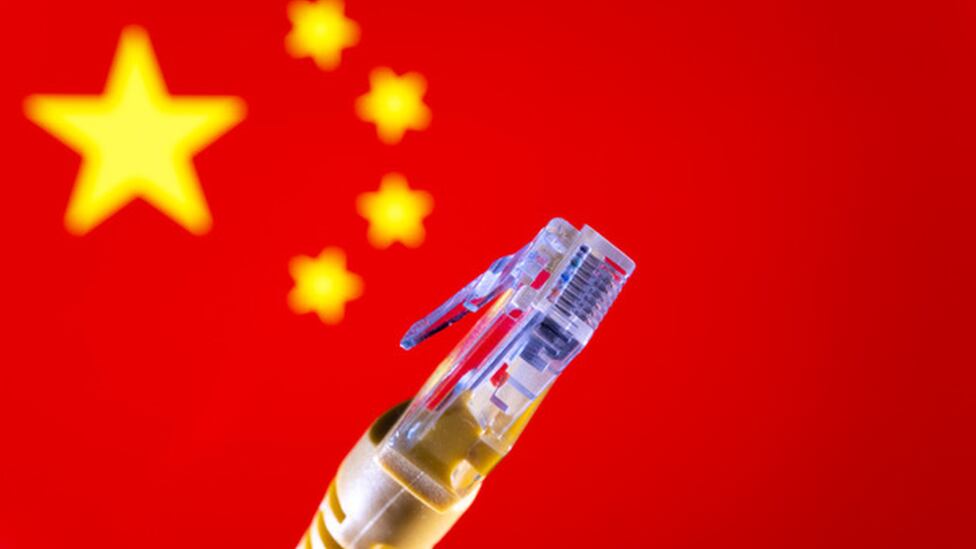The world, both physical and digital, is in an unprecedented time as the conflict in Ukraine rages on.
Mega-corporations like Meta, Google and Apple, which have always presented themselves as neutral tech firms, have now decided to show their political colors by banning their products from Russia in response to the invasion.
Meanwhile, the internet itself is changing for Russian users: Twitter and Facebook being blocked, TikTok preventing Russian users from uploading videos to its platform, and reports of police allegedly stopping people on the street to see what they’re watching on their phones.
There are now questions about whether the conflict could not only alter the world’s geography, but fundamentally change the nature of the internet.
Should Russia be disconnected from the internet?
Ukraine’s government has singled out individual tech firms asking them to suspend their services in Russia as the list of tech companies refusing to do business or sell their products in the country continues to grow by the day.
Now Ukraine’s leaders and tech experts are calling for something more forceful: disconnecting Russia from the internet entirely.
The calls received an emphatic “no” from ICANN (the Internet Corporation for Assigned Names and Numbers), charged with governing the internet. It was asked to revoke the highest caliber Russian domains such as .ru, as well as SSL certificates (Secure Socket Layers, or digital certificates as they are known in Spanish).
But the corporation’s motto is “one world, one internet,” and in his response to Ukraine’s deputy prime minister Mykhailo Fedorov, ICANN chief executive Goran Marby said: “Within our mission we maintain neutrality and act in support for the global internet. Our mission does not extend to taking punitive action, issuing sanctions, or restricting access to segments of the internet, no matter the type of provocation.”
The digital privacy group Electronic Frontier Foundation (EFF) was one of several organizations that supported this position.
In a statement, the EFF’s Corynne McSherry and Konstantinos Komaitis said the war was not a good time to “bother with the internet”. They asserted that tapping into internet infrastructure protocols could have “dangerous far-reaching consequences.”
These would include:
Cloudfare, a web infrastructure firm that offers protection against cyber attacks, has also received a request from Ukraine to end its services in Russia.
In a blog post, the firm said it had considered such requests, but concluded that “Russia needs more internet access, not less.”
What is a ‘splinternet’ and how does it work?

For many, calls to leave Russia without internet are a slippery slope towards what is known as ‘splinternet‘, a situation in which each country has different versions of the internet.
The Great Firewall of Chinaas it is known, is possibly the clearest example of how a country can create its own website.
In Iran, content on the web is also controlled and external information is limited through the state-owned Iran Telecommunications Company.
Russia has been experimenting with a sovereign internet, known as the Runet, for years, but unlike the Chinese version that was built from scratch, the Russian one is a version of the web retooled to work with the existing internet.
In 2019, the Russian government said it had successfully tested the system. At the time, few understood the need for such a system but now, in the context of the Ukraine invasion, “it makes much more sense,” said Professor Alan Woodward, a computer scientist at the University of Surrey in England.
In that test, Russian internet providers were asked to configure the internet within their borders as if it were a giant intranet (a private network of websites that do not communicate with the outside world).
The initiative involved restricting the points at which the Russian version of the web connected with its global counterpart.
Now it appears that Russia is once again testing such systems: In a Russian government memo, internet providers were asked to increase security and attempt to connect to DNS servers in Russia.
Some thought the memo, and the March 11 test end date, meant that Russia intended to pull the plug imminently.
Professor Woodward sees it as another test to see if they are ready: “This was more of a call from Russia to their internet providers to get ready, make local copies of the DNS (the internet phone book) and make local versions of third-party software that comes from servers outside of Russia, such as Javascript”.
Since then, Russia has denied that it was splitting up, saying the test was to protect Russian websites from foreign cyberattacks.
But James Griffiths, author of the book “The Great Firewall of China,” thinks the disconnect could happen at any time: “Cutting off the internet, making sure Russians only consume content approved by the Kremlin, makes strategic sense, so I You will realize the road we are traveling,” he told the BBC.
“I wouldn’t be surprised if it was implemented in the next few weeks or months.”
What consequences would it have?

Abishur Prakash, author of the book “The World is Vertical: How Technology is Remaking Globalization”, believes that the conflict is reshaping the internet, moving from “a global system in which the whole world has been connected” to something more fractured.
“Thanks to geopolitics, a different design for the internet is emerging in which nations are either going offline or developing an alternative of their own. Global bridges, like social media platforms, that have connected peoples for decades, are being torn down.” “.
And, according to James Griffiths, the new axis of net power will be divided between the West and China/Russia.
“Fang Binxing, known as the founding father of the Great Firewall of China, visited Russia in 2016 to assist them in what they were doing and make the Russian firewall much more like the Chinese one,” he added.
And now Russia will once again look to Beijing as internet firms begin to withdraw goods and services: “As the Russian economy is being cut off from the global economy, they are targeting China. They are going to have to rely in China much more than they have in the past.”
So far, technology firms like Huawei have not said anything about it.
Source: Elcomercio

:quality(75)/cloudfront-us-east-1.images.arcpublishing.com/elcomercio/GE4TAMJNGAZS2MJQKQYDAORRHE.jpg)

:quality(75)/cloudfront-us-east-1.images.arcpublishing.com/elcomercio/JPYS2JSCNZFVHKJMBAQ54SUD4Q.jpg)
:quality(75)/cloudfront-us-east-1.images.arcpublishing.com/elcomercio/RPJROQVAJ5B37H63IB4CPRCTJY.jpg)
:quality(75)/cloudfront-us-east-1.images.arcpublishing.com/elcomercio/IYDS3N674JCGPMG2OUWFIWVARY.jpg)
:quality(75)/cloudfront-us-east-1.images.arcpublishing.com/elcomercio/BEZRTXP6VNEI3KVRVELPE5C4XM.jpg)
